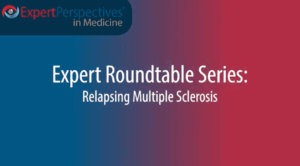Neurology
Relapsing Multiple Sclerosis
Considerations in Treating Relapsing Multiple Sclerosis During Pregnancy
Things have really changed in terms of caring for patients with relapsing MS who are looking to start a family. I want to emphasize that the decision to start a family should generally not be altered by relapsing MS; we can work through the process. We have approaches for treating relapsing MS throughout pregnancy that are very successful. In my view, people should not decide whether to start a family specifically based on their diagnosis once the disease is put into remission.
<br>
A recent breakthrough in this area has been with the use of CD20 B-cell–depleting agents. The pharmacologic half-lives of these therapeutic agents are relatively short, but the biologic half-life of the resulting B-cell depletion is significantly longer.
<br>
Overall, we really try to encourage patients with relapsing MS to be proactive about conception by monitoring fertility with ovulation strips, scheduling an appointment with a fertility specialist early on to address any ongoing concerns/issues, and using CD20 B-cell depletion therapy to provide a long-term anti-inflammatory benefit with the ability to wash out the medication before conception. If a patient is having trouble conceiving during a set interval, generally around 6 months, we can always provide another dose of the therapeutic agent and then wait for it to clear out again. The patient could then, again, have a trial of conception at that point. This approach has been very successful in our practice, and it has worked out quite well for most patients.
<br>
Another important consideration is breastfeeding. B-cell–depleting monoclonal antibodies are thought to minimally transfer into breast milk and are not thought to be absorbed by the breastfeeding infant to a significant degree. This means that even women who want to breastfeed may be able to resume infusible B-cell–depleting therapy after delivery. Of course, patients will want to discuss the risks, benefits, and alternatives with their physicians, and physicians will want to make sure that their patients are well informed about these issues.
<br>
Overall, recent treatment breakthroughs have really been quite revolutionary in terms of caring for women with relapsing MS who are looking to start a family.
We do not want relapsing MS to alter the decision to start a family; we have tools that can be used to get the disease under control and, hopefully, facilitate whatever family planning the patient chooses. In my practice, B-cell–depleting therapies are the mainstay for this population. We also use an approach with an infrequently dosed infusion of B-cell–depleting agents to get a patient’s disease under control, giving them a window of time when the drug still has this pharmacodynamic effect but with no medication in their system. And we can repeat these cycles as needed if the patient does not become pregnant.
<br>
I purposely avoid cell-trafficking agents such as the S1PR modulators and the VLA-4 inhibitors during family planning and pregnancy due to the potential for a rebound effect and to reduce the potential for any complications.
<br>
I preemptively try to choose B-cell–depleting therapy in any woman with relapsing MS who is of childbearing age because of the potential for unplanned pregnancies; it is really common for people’s life plans to change. In fact, over the years, I have had patients with relapsing MS in my office claiming that they did not want to start a family, but then, a couple of months later, they called back saying that they were pregnant. I think that it is good to have an upfront discussion with patients about these issues, regardless of whether pregnancy is in their near-term sight, just so they know what the principles are and that we are here to work with them.
We tell patients that relapsing MS pregnancies are normal pregnancies. They are not usually considered high-risk pregnancies, and it is important for patients to know that. We encourage patients who want to start a family to discuss family planning with their obstetrician and gynecologist, along with an anesthesiologist, whom they may see before delivery. Anything that the obstetrician and gynecologist and the anesthesiologist want to do is fine with us. Sometimes, anesthesiologists are a little concerned about performing epidurals, for example, in patients with relapsing MS; however, there is no reason not to do an epidural in these patients.
<br>
Again, the important thing for women with relapsing MS to know is that their pregnancies are not high risk. In our practice, we employ the same disease-modifying strategies that my colleagues have discussed here. I also want to note that the chance of a relapse decreases during pregnancy and continues to decrease with each trimester. This protective effect is associated with both hormonal and immunologic changes.
Galati A, McElrath T, Bove R. Use of B-cell–depleting therapy in women of childbearing potential with multiple sclerosis and neuromyelitis optica spectrum disorder. Neurol Clin Pract. 2022;12(2):154-163. doi:10.1212/CPJ.0000000000001147
<br>
Graham EL, Bove R, Costello K, et al. Practical considerations for managing pregnancy in patients with multiple sclerosis. Neurol Clin Pract. 2024;14(2):e200253. doi:10.1212/CPJ.0000000000200253
<br>
Houtchens MK, Edwards NC, Phillips AL. Relapses and disease-modifying drug treatment in pregnancy and live birth in US women with MS. Neurology. 2018;91(17):e1570-e1578. doi:10.1212/WNL.0000000000006382
<br>
Krysko KM, Dobson R, Alroughani R, et al. Family planning considerations in people with multiple sclerosis. Lancet Neurol. 2023;22(4):350-366. doi:10.1016/S1474-4422(22)00426-4
<br>
Varytė G, Zakarevičienė J, Ramašauskaitė D, Laužikienė D, Arlauskienė A. Pregnancy and multiple sclerosis: an update on the disease modifying treatment strategy and a review of pregnancy’s impact on disease activity. Medicina (Kaunas). 2020;56(2):49. doi:10.3390/medicina56020049
<br>
Villaverde-González R. Updated perspectives on the challenges of managing multiple sclerosis during pregnancy. Degener Neurol Neuromuscul Dis. 2022;12:1-21. doi:10.2147/DNND.S203406













